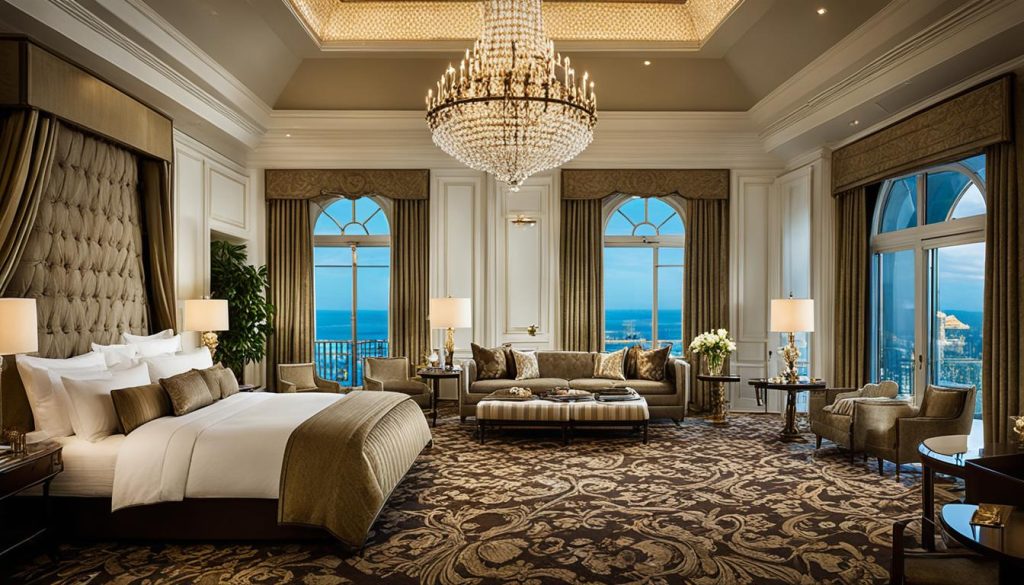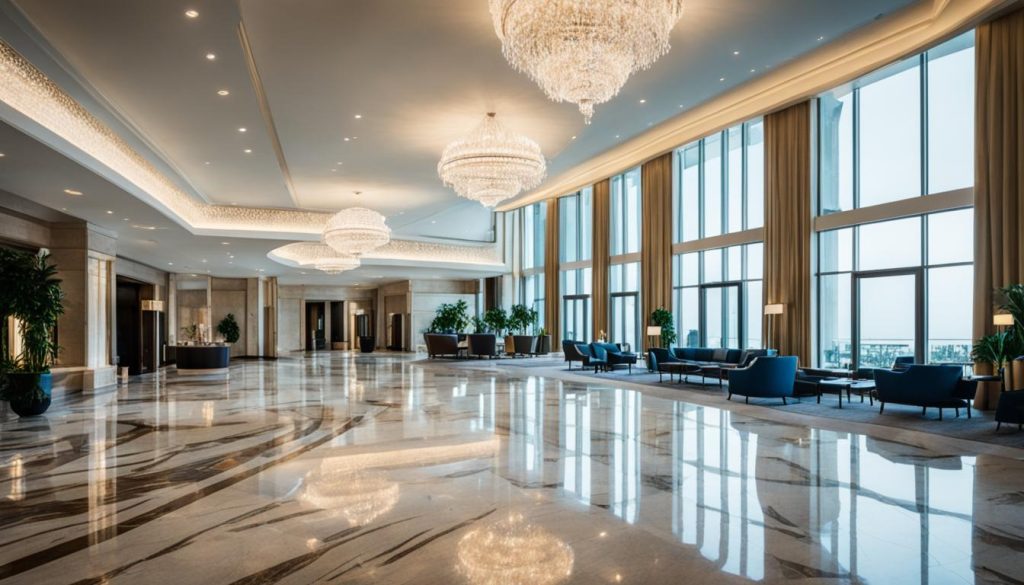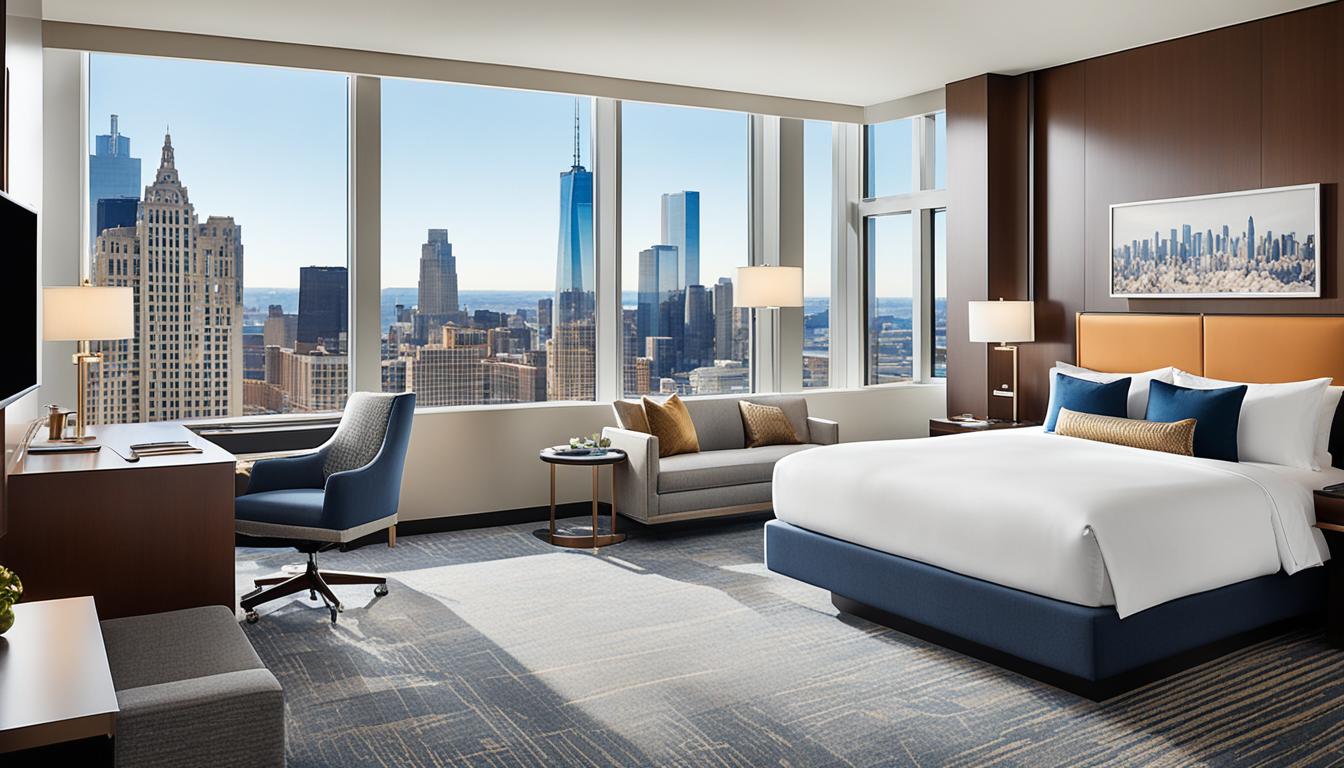Global Comfort and Experience Luxury in International Standard Hotels of Distinction
Welcome to the world of international standard hotels, where luxury meets global standards and guests are pampered with the utmost comfort and elegance. These premium establishments provide a haven for travelers seeking high-end accommodations with international quality. From well-known luxury hotel operators like Hilton Hotels & Resorts and Marriott International to a wide range of worldwide standard hotels, the options for indulging in luxurious experiences are endless.
International standard hotels are renowned for their commitment to excellence and attention to detail. Every aspect, from the enchanting decor to the impeccable service, is meticulously designed to create a memorable stay. The goal is to surpass expectations and deliver an experience that is second to none.
These luxury hotels go beyond providing a place to rest and rejuvenate. They embrace the concept of experiential hospitality, offering guests unique and immersive experiences that reflect the local culture and surroundings. Whether it’s savoring world-class cuisine, indulging in spa treatments, or exploring the vibrant cityscape, every moment is thoughtfully curated to ensure the ultimate luxury experience.
Over the years, luxury hotels have established a rich history, with iconic establishments like the Ritz Paris and The Plaza Hotel New York setting higher standards for luxury and grandeur. Today, major players in the industry such as Accor, Marriott, and Hilton continue to refine and expand their luxury brands, amenities, and levels of service to meet the expectations of discerning travelers.
Key Takeaways:
- International standard hotels offer unparalleled comfort and luxury.
- These hotels prioritize excellence, elegance, and exclusivity.
- Experiential hospitality is a major trend in luxury establishments.
- Luxury hotels have a rich history, with iconic establishments setting high standards.
- Major players in the industry continuously refine their luxury brands to meet the expectations of discerning travelers.
Overview of Luxury Brands in the Hospitality Industry
Luxury brands in the hospitality industry are synonymous with excellence, elegance, and exclusivity. From luxury hotel groups to boutique properties, these establishments strive to provide exceptional service and create unforgettable experiences for their guests.
With a strong emphasis on aesthetics and attention to detail, luxury brands prioritize the beauty and design of their accommodations. State-of-the-art facilities and world-class amenities ensure that every aspect of the guest’s stay is opulent and luxurious. These establishments go above and beyond to deliver personalized experiences tailored to individual preferences, enhancing the overall stay and creating lasting memories.
The luxury travel industry, including high-end hotels, resorts, and airlines, embraces elements of glamour and indulgence, catering to the discerning tastes and preferences of their guests. These brands understand the desire for luxurious experiences that surpass expectations, and they consistently deliver on this promise.
“Luxury hospitality is about offering an experience that reflects the local culture while maintaining the highest standards of service quality.” – Luxury Hotel Group Manager
Experiential hospitality is a central focus of luxury brands in the industry. They aim to provide guests with unique and immersive experiences that go beyond traditional hospitality. By incorporating local elements, such as cuisine, art, and cultural activities, luxury brands create an authentic atmosphere that allows guests to immerse themselves in the destination’s charm.
Ultimately, luxury brands in the hospitality industry strive to redefine luxury and exceed guest expectations. Whether it’s a world-renowned hotel group or an exclusive boutique property, these establishments represent the epitome of luxury, offering refined accommodations and unparalleled service.
Key Features of Luxury Brands in the Hospitality Industry:
- Superiority: Luxury brands set themselves apart by providing the highest level of service and attention to detail.
- Comfort: Opulent accommodations and upscale amenities ensure guests’ utmost comfort and relaxation.
- Elegance: Exquisite design and impeccable aesthetics create a sophisticated and refined ambiance.
- Exclusivity: Luxury brands offer a sense of exclusivity and tailored experiences for their discerning guests.
History of Luxury Brands in the Hospitality Industry
Luxury has been a part of human existence for centuries, but it was in the late 18th and 19th centuries that the hospitality industry began to make luxury more accessible through opulent hotel chains and personalized services. Iconic establishments such as the Ritz Paris and The Plaza Hotel New York opened during this time, setting higher standards for luxury and creating a legacy that continues today. Major players in the hospitality industry, including Accor, Marriott, and Hilton, have built upon this legacy and continuously refine their luxury brands, sophisticated amenities, and levels of service.
During the late 18th and 19th centuries, the hospitality industry witnessed the emergence of iconic luxury hotels that would go on to define the industry’s high standards and grandeur. An example of this is the Ritz Paris, which opened its doors in 1898 and quickly established itself as a symbol of luxury and elegance. The Ritz Paris became known for its opulent interior, impeccable service, and grandeur, attracting wealthy and influential guests from around the world.
Iconic Establishments
“Luxury is in each detail” – Hubert de Givenchy
Another iconic establishment that emerged during this period is The Plaza Hotel in New York City. Built in 1907, The Plaza Hotel became an architectural masterpiece known for its grandeur and extravagant amenities. This iconic hotel has been featured in numerous films and books, solidifying its status as a symbol of luxury and sophistication.
These iconic establishments set the stage for luxury in the hospitality industry and influenced the development of luxury hotel chains and operators. Today, luxury hotel chains such as Accor, Marriott, and Hilton have embraced the legacy of these iconic establishments and continue to deliver exceptional service, luxurious accommodations, and memorable experiences to their guests.
| Iconic Establishment | Year Established | Location |
|---|---|---|
| The Ritz Paris | 1898 | Paris, France |
| The Plaza Hotel | 1907 | New York City, USA |
Types of Luxury Brands in the Hospitality Industry
The luxury hospitality industry offers travelers a variety of options when seeking high-end accommodations and experiences. Among these options, three types of luxury brands stand out: hotel and resort chains, cruise lines, and airlines.
1. Luxury Hotel Chains
Luxury hotel chains prioritize comfort, opulence, tranquility, and authenticity, offering guests a unique and unforgettable stay. These chains are renowned for their commitment to excellence and provide world-class amenities and services. From renowned brands such as Hilton Hotels & Resorts and Marriott International to boutique luxury chains, guests can expect unparalleled luxury and personalized attention. Whether it’s a city center hotel or a secluded resort, luxury hotel chains ensure a memorable experience for their guests.
2. Luxury Resorts
Luxury resorts are known for their stunning locations and exceptional amenities, making them top choices for travelers seeking a truly luxurious experience. These resorts often boast picturesque views, pristine beaches, lush landscapes, and world-class facilities. From private villas with personalized butler service to wellness retreats offering rejuvenating spa treatments, luxury resorts cater to guests looking for relaxation, indulgence, and exclusivity. Whether it’s a tropical island getaway or a secluded mountain retreat, luxury resorts offer a perfect blend of nature, relaxation, and opulence.
3. Luxury Cruise Lines
Cruise lines provide travelers with the opportunity to visit multiple destinations while enjoying luxurious accommodations, entertainment, and unparalleled service. Luxury cruise lines offer lavish suites, gourmet dining options, exclusive amenities, and unique onboard experiences. From elegant ocean liners to intimate river cruises, luxury cruise lines ensure that guests experience the height of luxury while exploring the world’s most beautiful destinations. Whether it’s cruising through the crystal-clear waters of the Caribbean or navigating the majestic rivers of Europe, luxury cruise lines offer unforgettable journeys filled with luxury, comfort, and adventure.
4. Luxury Airlines
Airlines also play a significant role in the luxury hospitality industry, offering first-class amenities and services that go beyond mere transportation. Luxury airlines prioritize comfort, privacy, and exceptional service, providing travelers with a truly premium flying experience. From spacious and private suites to gourmet dining, personalized concierge services, and exclusive lounges, luxury airlines elevate air travel to new heights. Whether it’s a short-haul flight or a long-haul journey, luxury airlines ensure that every aspect of the travel experience is luxurious, convenient, and memorable.

In conclusion, luxury brands in the hospitality industry cater to discerning travelers seeking high-end accommodations and experiences. From luxury hotel chains and resorts to luxury cruise lines and airlines, these brands prioritize authenticity, opulence, and exceptional service to create unforgettable travel experiences. Whether it’s indulging in world-class amenities at a luxury resort, exploring multiple destinations on a luxury cruise, or enjoying a premium flying experience with a luxury airline, travelers can expect nothing less than the epitome of luxury and unparalleled comfort.
Benefits of Luxury Brands in the Hospitality Industry
Being considered a luxury brand in the hospitality industry brings several benefits. Luxury brands are known for their meticulous planning, consistent effort, and impeccable service, which result in increased customer satisfaction. Satisfied customers are more likely to have a positive experience and speak positively about their interaction with a luxury brand, generating positive word-of-mouth and attracting new customers.
Luxury brands also enjoy enhanced brand recognition, as they establish strong brand identities through eye-catching logos, distinctive architectural designs, luxurious interiors, and incredible services. When customers see these visual cues and experience the high-quality services offered by luxury brands, they instantly recognize the brand and associate it with prestige and exclusivity. This recognition not only attracts new customers but also reinforces the loyalty of existing customers.
Customer loyalty is another significant benefit of luxury brands in the hospitality industry. By consistently delivering high-quality products and services, luxury brands build a loyal customer base that contributes to a steady stream of revenue. Customers who experience the luxury accommodations, upscale amenities, and personalized attention provided by luxury hotel groups are likely to choose these brands repeatedly for their future travel needs.
Luxury hotel groups are renowned for their commitment to providing world-class services and upscale amenities. From lavish suites and fine dining experiences to spa facilities and exclusive concierge services, luxury brands go above and beyond to ensure a memorable stay for their guests. These high-quality services and upscale amenities add value to the customer experience, setting luxury brands apart from their competitors in the hospitality industry.
| Benefits of Luxury Brands in the Hospitality Industry |
|---|
| Increased customer satisfaction through meticulous planning and impeccable service |
| Positive word-of-mouth and attracting new customers |
| Enhanced brand recognition through visual cues and luxury experiences |
| Building customer loyalty through high-quality products and services |
| Providing world-class services and upscale amenities for an unforgettable customer experience |
Challenges Faced by Luxury Brands in the Hospitality Industry
While working in the luxury hospitality industry can be fulfilling, it also comes with its fair share of challenges. One of the initial challenges faced by luxury brands is the significant operational costs they incur. Establishing and maintaining a luxury hotel chain or upscale resort brand requires a substantial financial investment, as well as ongoing spending to maintain world-class amenities and standards.
Competition among luxury brands is another significant challenge faced by the hospitality industry. With an increasing number of deluxe accommodation options globally, including boutique hotels that offer personalized and unique experiences, luxury brands must constantly strive to differentiate themselves and attract discerning guests.
The changing preferences of customers also pose a challenge for luxury brands. Modern travelers seek authentic experiences that allow them to connect with local culture, embrace sustainability practices, enjoy seamless digital transactions, and access the latest hospitality technology. It is crucial for luxury brands to adapt to these changing preferences in order to stay relevant and meet the expectations of their discerning guests.

Despite these challenges, luxury brands in the hospitality industry have the opportunity to thrive by leveraging their unique offerings, impeccable service, and attention to detail. By continuously refining their strategies, embracing innovation, and creating unforgettable experiences, luxury brands can overcome these challenges and ensure their place in the evolving global luxury hospitality landscape.
| Challenges | Solutions |
|---|---|
| High operational costs | Implementing effective cost management strategies, optimizing operational efficiencies, and finding innovative ways to reduce expenses without compromising on quality. |
| Competition among luxury brands | Investing in unique selling propositions, enhancing brand differentiation, and continuously refining the guest experience to stand out in a crowded market. |
| Changing customer preferences | Conducting market research, staying updated with the latest trends, investing in technology, sustainability practices, and personalization to meet evolving customer demands. |
Marketing Strategies for Luxury Brands in the Hospitality Industry
When it comes to marketing strategies, luxury brands in the hospitality industry have the opportunity to create exceptional experiences that leave a lasting impression on their guests. By focusing on personalized customer experiences, luxury branding and positioning, and effective social media marketing, these brands can attract and retain discerning customers seeking the epitome of luxury and comfort.
Personalized Customer Experience
A key differentiator for luxury brands in the hospitality industry is their ability to provide personalized experiences tailored to each guest’s preferences and desires. From the moment a guest arrives, every interaction should be customized to create a sense of exclusivity and attention to detail. By understanding guests’ preferences, luxury hotel chains can go above and beyond to exceed expectations, ensuring a memorable stay that keeps guests coming back.
Luxury Branding and Positioning
Luxury branding goes beyond offering luxurious amenities and focuses on creating a complete hospitality experience that evokes emotions and memories associated with comfort and opulence. It is essential for luxury brands to establish a high-end positioning that showcases their unique value proposition and creates a strong brand identity. From distinctive architectural designs to sophisticated interiors, every aspect of the brand should embody luxury and elegance.
Social Media Marketing for Luxury Hotels
As social media continues to dominate the digital landscape, luxury brands must leverage its power to engage with their target audience and boost brand awareness. Through visually engaging content, luxury hotels can showcase their unique features, luxurious settings, and exceptional services. Social media platforms provide an opportunity to interact directly with potential guests, build relationships, and promote the brand’s values and offerings.
| Benefits of Social Media Marketing for Luxury Hotels | Examples |
|---|---|
| Increased brand visibility and awareness | Luxury hotel brand A showcases stunning visuals of its properties, highlighting their unique features and luxurious amenities. |
| Engagement with target audience | Luxury hotel brand B actively responds to comments and messages, building a rapport with potential guests and addressing their inquiries. |
| Showcasing unique experiences | Luxury hotel brand C shares behind-the-scenes footage of curated experiences, giving followers a glimpse into the exclusive offerings. |
| Promoting special offers and packages | Luxury hotel brand D runs targeted social media campaigns to promote limited-time offers, enticing potential guests to book a stay. |
By incorporating compelling visuals, engaging content, and thoughtful interactions on social media platforms, luxury brands can enhance their online presence, attract their target audience, and ultimately drive bookings and revenue.
Conclusion
The luxury brands in the hospitality industry play a pivotal role in delivering global comfort and luxury to discerning travelers. These brands prioritize exceptional service, personalized experiences, and upscale amenities to create unforgettable moments for their esteemed guests. Despite facing challenges such as high operational costs, intense competition, and shifting customer preferences, luxury brands continue to adapt and refine their offerings to meet the demands of the modern traveler.
Implementing effective marketing strategies is crucial for luxury brands to enhance customer satisfaction, establish brand recognition, and cultivate customer loyalty. Creating personalized customer experiences remains at the forefront of these strategies, ensuring that every interaction exceeds the expectations of guests. High-end branding further elevates the luxury experience, invoking emotions of opulence and comfort. Additionally, leveraging social media platforms allows luxury brands to actively engage with their target audience, showcasing distinctive features and fostering brand awareness.
The future of the luxury hospitality industry is poised with exciting opportunities for both travelers and brands. As the pursuit of global comfort and luxury continues to evolve, luxury brands will continue to adapt and innovate, offering even more extraordinary experiences to their discerning guests.
FAQ
What are international standard hotels?
International standard hotels are accommodations that meet a set of global standards for comfort, luxury, and service excellence.
What defines luxury hotels meeting global standards?
Luxury hotels meeting global standards are establishments that prioritize superiority, comfort, elegance, and exclusivity, offering exceptional service and unforgettable experiences to their guests.
What are premium international hotels?
Premium international hotels are high-end accommodations that provide luxury and global standards in terms of amenities, service, and overall guest experience.
What do we mean by high-end hotels with international quality?
High-end hotels with international quality are luxury accommodations that uphold global standards for comfort, elegance, and exceptional service, providing a superior experience to discerning travelers.
Do worldwide standard hotels exist?
Yes, worldwide standard hotels refer to accommodations that meet and maintain a consistent level of international quality and luxury across different locations globally.

